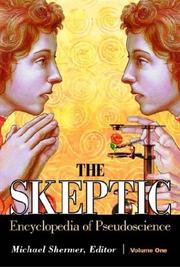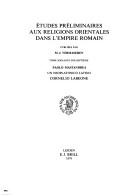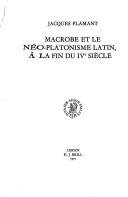| Listing 1 - 10 of 11 | << page >> |
Sort by
|

ISBN: 1576076539 Year: 2002 Publisher: Santa Barbara (Calif.) : ABC-CLIO,
Abstract | Keywords | Export | Availability | Bookmark
 Loading...
Loading...Choose an application
- Reference Manager
- EndNote
- RefWorks (Direct export to RefWorks)
Pseudoscience --- pseudoscience --- Skeptic magazine --- science --- encyclopedia
Book
ISBN: 2130460771 9782130460770 Year: 1994 Volume: 2829 Publisher: Paris: PUF,
Abstract | Keywords | Export | Availability | Bookmark
 Loading...
Loading...Choose an application
- Reference Manager
- EndNote
- RefWorks (Direct export to RefWorks)
History of philosophy --- Skepticism --- Scepticisme --- History --- Histoire --- Septicisme --- --Skeptic philosophy --- Philosophy, Ancient. --- Skeptic philosophy --- --Skepticism

ISBN: 9004058761 9004295569 9789004058767 Year: 1979 Volume: 77 Publisher: Leiden: Brill,
Abstract | Keywords | Export | Availability | Bookmark
 Loading...
Loading...Choose an application
- Reference Manager
- EndNote
- RefWorks (Direct export to RefWorks)
Labeo, Cornelius --- 186.4 --- Philosophy & psychology Skeptic and Neoplatonic --- Labeone, Cornelio --- Labeo, Cornelius.

ISBN: 9004054065 9004295305 9789004054066 Year: 1977 Volume: 58 Publisher: Leiden: Brill,
Abstract | Keywords | Export | Availability | Bookmark
 Loading...
Loading...Choose an application
- Reference Manager
- EndNote
- RefWorks (Direct export to RefWorks)
Macrobius, Ambrosius Aurelius Theodosius --- Neoplatonism --- Néo-platonisme --- 141.131 --- 186.4 --- Alexandrian school --- Church history --- Hellenism --- Philosophy --- Philosophy, Ancient --- Platonists --- Theosophy --- Platonisme. Neoplatonisme --- Philosophy & psychology Skeptic and Neoplatonic --- Macrobe --- Macrobio --- Macrobio, Ambrogio Teodosio --- Macrobius, Aur. Theodosius --- Macrobius, Aurelius Theodosius --- Macrobius Theodosius, Ambrosius --- Theodosius, Ambrosius Macrobius --- Neoplatonism. --- Macrobius, Ambrosius Aurelius Theodosius. --- 141.131 Platonisme. Neoplatonisme --- Néo-platonisme --- Primitive and early church
Book
ISBN: 9782130562689 213056268X Year: 2008 Volume: 2829 Publisher: Paris: PUF,
Abstract | Keywords | Export | Availability | Bookmark
 Loading...
Loading...Choose an application
- Reference Manager
- EndNote
- RefWorks (Direct export to RefWorks)
Le projet de trouver enfin la connaissance certaine qui annihilerait le caractère universel du doute est présent depuis plus de deux millénaires dans la conscience philosophique de l'Occident périodiquement, la défaite du scepticisme est donc annoncée. Mais de Pyrrhon à la philosophie analytique contemporaine en passant par Cicéron, Augustin ou Montaigne, les traditions sceptiques sont nombreuses, parfois contradictoires, et il est peu de doctrines qui auront autant contribué à la transformation historique, scientifique et culturelle de l'Occident. En revenant sur cette philosophie du doute protéiforme, cet ouvrage montre qu'il est erroné de se représenter le scepticisme comme un système anhistorique. C'est dans la plasticité de la pensée sceptique que se trouve l'explication de son efficacité et de ses limites.
Skepticism --- Scepticisme --- Skepticism. --- Skeptic philosophy --- Philosophy, Ancient. --- BPB0803 --- 1 <09> --- 211.5 --- Filosofie. Psychologie--Geschiedenis van ... --- Agnosticisme. Scepticisme. Ongeloof. Vrijdenkers. Laïcisering --- 211.5 Agnosticisme. Scepticisme. Ongeloof. Vrijdenkers. Laïcisering --- 1 <09> Filosofie. Psychologie--Geschiedenis van ... --- Filosofie. Psychologie--Geschiedenis van .. --- Filosofie. Psychologie--Geschiedenis van . --- Filosofie. Psychologie--Geschiedenis van
Book
ISBN: 0520965477 9780520965478 9780520291843 Year: 2017 Publisher: Oakland, California
Abstract | Keywords | Export | Availability | Bookmark
 Loading...
Loading...Choose an application
- Reference Manager
- EndNote
- RefWorks (Direct export to RefWorks)
Critical Thinking prepares students to thoughtfully interpret information and develop a sophisticated understanding of our increasingly complex and multi-mediated world. Peter M. Nardi's approach helps students sharpen their critical thinking skills and improve their analytical reasoning, enabling them to ward off gullibility, develop insightful skepticism, and ask the right questions about material online, in the mass media, or in scholarly publications. Students will learn to understand common errors in thinking; create reliable and valid research methodologies; understand social science concepts needed to make sense of popular and academic claims; and communicate, apply, and integrate the methods learned in both research and daily life. A companion website includes links to articles and books mentioned in the chapters, illustrative items, videos, and current news and research that elaborate on each chapter's key concepts.
Critical thinking. --- academic. --- analysis. --- analytical reasoning. --- asking questions. --- classroom. --- close reading. --- college. --- critical thinking. --- high school. --- key concepts. --- mass media. --- multi media. --- practical. --- reading skills. --- research methodologies. --- research methods. --- research skills. --- research. --- scholarly publications. --- scholarly. --- skeptic. --- skepticism. --- social science. --- students. --- study skills. --- university. --- useful. --- videos. --- writing skills.
Book
ISSN: 00696587 ISBN: 951653323X 9789516533233 Year: 2003 Volume: 120 Publisher: Helsinki: Societas scientiarum Fennica,
Abstract | Keywords | Export | Availability | Bookmark
 Loading...
Loading...Choose an application
- Reference Manager
- EndNote
- RefWorks (Direct export to RefWorks)
Aesthetics, Ancient. --- Philosophy, Ancient. --- Art and philosophy. --- Plotinus --- Contributions in aesthetics. --- 186.4 --- Philosophy & psychology Skeptic and Neoplatonic --- Aesthetics, Ancient --- Art and philosophy --- Philosophy, Ancient --- Ancient philosophy --- Greek philosophy --- Philosophy, Greek --- Philosophy, Roman --- Roman philosophy --- Philosophy and art --- Philosophy --- Art --- Plotin --- Plotinos --- Aesthetics. --- Estetik. --- Plotinos, --- Boluoding --- Iflūṭīn --- Plotino --- Plōtinos --- Plotinus, --- Plotyn --- Πλωτι̂νος --- פלוטינוס --- أفلوطين --- Plotinus - Contributions in aesthetics. --- Plotin, philosophe grec, vers 205-170 --- Critique et interpretation
Book
ISBN: 1280494050 9786613589286 1400842328 9781400842322 9780691138602 0691138605 9780691159706 069115970X Year: 2012 Publisher: Princeton, NJ
Abstract | Keywords | Export | Availability | Bookmark
 Loading...
Loading...Choose an application
- Reference Manager
- EndNote
- RefWorks (Direct export to RefWorks)
This is a major reinterpretation of ancient philosophy that recovers the long Greek and Roman tradition of philosophy as a complete way of life--and not simply an intellectual discipline. Distinguished philosopher John Cooper traces how, for many ancient thinkers, philosophy was not just to be studied or even used to solve particular practical problems. Rather, philosophy--not just ethics but even logic and physical theory--was literally to be lived. Yet there was great disagreement about how to live philosophically: philosophy was not one but many, mutually opposed, ways of life. Examining this tradition from its establishment by Socrates in the fifth century BCE through Plotinus in the third century CE and the eclipse of pagan philosophy by Christianity, Pursuits of Wisdom examines six central philosophies of living--Socratic, Aristotelian, Stoic, Epicurean, Skeptic, and the Platonist life of late antiquity. The book describes the shared assumptions that allowed these thinkers to conceive of their philosophies as ways of life, as well as the distinctive ideas that led them to widely different conclusions about the best human life. Clearing up many common misperceptions and simplifications, Cooper explains in detail the Socratic devotion to philosophical discussion about human nature, human life, and human good; the Aristotelian focus on the true place of humans within the total system of the natural world; the Stoic commitment to dutifully accepting Zeus's plans; the Epicurean pursuit of pleasure through tranquil activities that exercise perception, thought, and feeling; the Skeptical eschewal of all critical reasoning in forming their beliefs; and, finally, the late Platonist emphasis on spiritual concerns and the eternal realm of Being. Pursuits of Wisdom is essential reading for anyone interested in understanding what the great philosophers of antiquity thought was the true purpose of philosophy--and of life.
Conduct of life. --- Wisdom. --- Philosophy, Ancient. --- Ethics, Practical --- Morals --- Personal conduct --- Ethics --- Philosophical counseling --- Experience --- Intellect --- Learning and scholarship --- Reason --- Ancient philosophy --- Greek philosophy --- Philosophy, Greek --- Philosophy, Roman --- Roman philosophy --- Aristotelian life. --- Aristotle. --- Epicurean life. --- Epicurus. --- Hadot. --- Plato. --- Platonism. --- Platonist life. --- Plotinus. --- Pyrrhonian skepticism. --- Sextus Empiricus. --- Skeptic life. --- Socrates. --- Socratic knowledge. --- Socratic life. --- Stoic life. --- Stoicism. --- Stoics. --- ancient philosophy. --- biology. --- contemplative life. --- dialectic. --- ethics. --- happiness. --- human life. --- logic knowledge. --- logic. --- metaphysics. --- moral philosophy. --- physical theory. --- skeptics. --- virtues. --- wisdom.
Book
ISSN: 01530828 ISBN: 9782711619559 2711619559 Year: 2009 Volume: 67 Publisher: Paris: Vrin,
Abstract | Keywords | Export | Availability | Bookmark
 Loading...
Loading...Choose an application
- Reference Manager
- EndNote
- RefWorks (Direct export to RefWorks)
Les uns sont fascinés par la hardiesse et la constance de sa pensée, les autres la rejettent au motif que sa métaphysique est extravagante et son raisonnement obscur. Mais alors, quel profit tirer de la lecture de l’œuvre de Plotin ? Mieux que tout autre, Plotin réussit à faire le point sur les doctrines philosophiques qui l’ont précédé, y compris le scepticisme. Et il y parvient avec une perspicacité et une originalité exceptionnelles, tout en restant un strict partisan du platonisme. Interpréter Plotin dans sa confrontation avec ses prédécesseurs, c’est prendre part à un passionnant débat et soumettre à une évaluation les acquis et les limites de chacun. Telle est la démarche à laquelle invite ce livre qui est consacré à la théorie du savoir. Après que le doute sceptique ait ébranlé les théories antérieures, Plotin innove en faisant coïncider savoir objectif et connaissance de soi. Ce geste théorique, ses antécédents et ses conséquences sont au cœur de ce travail de recherche.
Self-knowledge, Theory of --- Connaissance de soi --- Early works to 1800 --- Ouvrages avant 1800 --- Plotinus --- Knowledge, Theory of --- Skepticism --- Philosophy, Ancient --- History --- Philosophy, Ancient. --- Skepticism. --- Philosophie ancienne. --- Scepticisme. --- Théorie de la connaissance. --- History. --- Histoire. --- Classical Greek philosophy --- Skeptic --- Criticism --- Scepticism --- Unbelief --- Agnosticism --- Belief and doubt --- Free thought --- Introspection (Theory of knowledge) --- Knowledge, Reflexive --- Knowledge of self, Theory of --- Reflection (Theory of knowledge) --- Reflexive knowledge --- Personality (Theory of knowledge) --- Self (Philosophy) --- Ancient philosophy --- Greek philosophy --- Philosophy, Greek --- Philosophy, Roman --- Roman philosophy --- Plotinus. --- Plotin --- Plotinos --- Boluoding --- Iflūṭīn --- Plotino --- Plōtinos --- Plotinus, --- Plotyn --- Πλωτι̂νος --- פלוטינוס --- أفلوطين --- Knowledge, Theory of - History --- Self-knowledge, Theory of - History
Book
ISBN: 1282964542 9786612964541 1400836913 9781400836918 9781282964549 9780691143972 0691143978 6612964545 Year: 2011 Publisher: Princeton, N.J.: Princeton university press,
Abstract | Keywords | Export | Availability | Bookmark
 Loading...
Loading...Choose an application
- Reference Manager
- EndNote
- RefWorks (Direct export to RefWorks)
In this book, Ernest Sosa explains the nature of knowledge through an approach originated by him years ago, known as virtue epistemology. Here he provides the first comprehensive account of his views on epistemic normativity as a form of performance normativity on two levels. On a first level is found the normativity of the apt performance, whose success manifests the performer's competence. On a higher level is found the normativity of the meta-apt performance, which manifests not necessarily first-order skill or competence but rather the reflective good judgment required for proper risk assessment. Sosa develops this bi-level account in multiple ways, by applying it to issues much disputed in recent epistemology: epistemic agency, how knowledge is normatively related to action, the knowledge norm of assertion, and the Meno problem as to how knowledge exceeds merely true belief. A full chapter is devoted to how experience should be understood if it is to figure in the epistemic competence that must be manifest in the truth of any belief apt enough to constitute knowledge. Another takes up the epistemology of testimony from the performance-theoretic perspective. Two other chapters are dedicated to comparisons with ostensibly rival views, such as classical internalist foundationalism, a knowledge-first view, and attributor contextualism. The book concludes with a defense of the epistemic circularity inherent in meta-aptness and thereby in the full aptness of knowing full well.
Virtue epistemology. --- Epistemic virtue --- Epistemology, Virtue --- Knowledge, Theory of --- Virtue epistemology --- AAA normativity. --- AAA structure. --- Meno problem. --- Meno. --- Plato. --- Platonic problems. --- Theaetus. --- apprehension. --- assertion. --- awareness. --- belief. --- bootstrapping. --- circularity. --- contextualism. --- contextualist fallacy. --- epistemic agency. --- epistemic circularity. --- epistemic faculties. --- epistemic normativity. --- epistemic performances. --- epistemology. --- experience. --- experiential states. --- human knowledge. --- ignorance. --- interlocutors. --- knowledge first. --- knowledge. --- meta-aptness. --- normativity. --- perceptual knowledge. --- performance aims. --- performance based. --- performance normativity. --- proper action. --- propositional experience. --- radical knowledge. --- relevant alternatives. --- sensa. --- sense data. --- sensory experience. --- skeptic. --- testimonial knowledge. --- testimonies. --- testimony. --- threshold setting. --- traditional knowledge. --- true belief. --- trust. --- virtue epistemology. --- Ethics --- Philosophy
| Listing 1 - 10 of 11 | << page >> |
Sort by
|

 Search
Search Feedback
Feedback About UniCat
About UniCat  Help
Help News
News